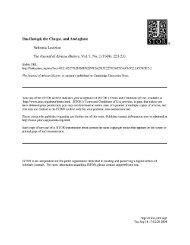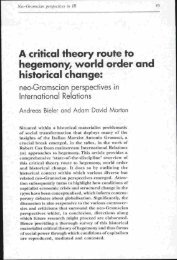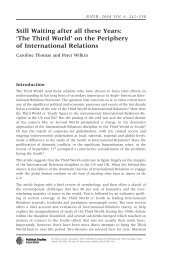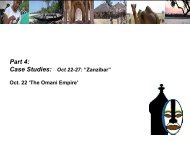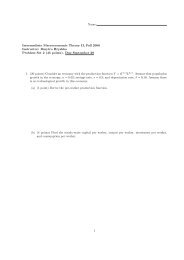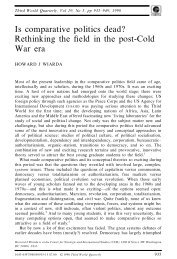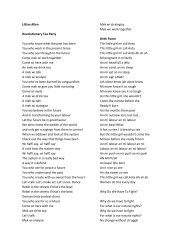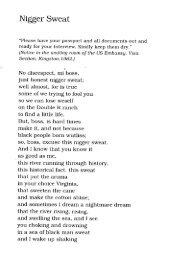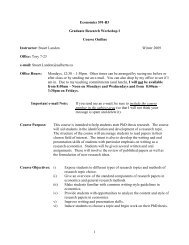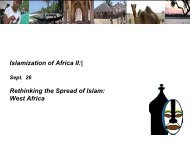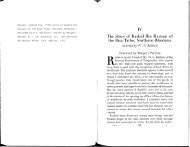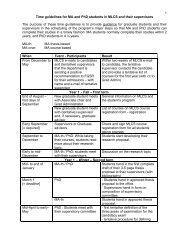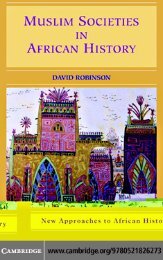personal memories revolutionary states and indian ocean migrations
personal memories revolutionary states and indian ocean migrations
personal memories revolutionary states and indian ocean migrations
Create successful ePaper yourself
Turn your PDF publications into a flip-book with our unique Google optimized e-Paper software.
In reality, however, while Steere enjoyed many theological discussions with<br />
Muslims, he felt that he lacked the gift of evangelism; he saw his focus on<br />
underst<strong>and</strong>ing Muslims <strong>and</strong> other Africans rather than evangelizing them was a<br />
flaw: “I do not possess some of the essential elements of a Missionary character. I<br />
can be very friendly with Negroes <strong>and</strong> Arabs, <strong>and</strong> can learn to use their language,<br />
<strong>and</strong> enter into their modes of thought, mainly because I am content to accept them<br />
as my teachers rather than to put myself forward to teach them.” 18 It was for this<br />
reason that he declined, at first, the request to become bishop of Zanzibar, a post<br />
he accepted under pressure.<br />
A major impediment to evangelism among Muslims, Steere wrote, is the<br />
threat hanging over any convert from Islam. Sultan Majid warned the first<br />
missionaries that if they made any converts, “there were many people in the town<br />
who would consider it a duty to cut their throats, <strong>and</strong> he could not protect them.”<br />
Missionaries were under European protection <strong>and</strong> had nothing to fear, but Steere<br />
was disturbed by the idea that “one is bidding another to danger his life, while one’s<br />
own is in perfect safety.” 19 Nonetheless, there was at least one Muslim convert to<br />
Christianity in Zanzibar, an Arab named ‘Abdallah b. Muhammad, who had learned<br />
English from Bishop Steere.<br />
As long as he was only an enquirer he might st<strong>and</strong> at the end of<br />
the Slave Market Church, <strong>and</strong> no notice was taken. But one day he<br />
uncovered his head, <strong>and</strong> knelt down among the Christians. The<br />
next day, the enlightened Seyid Barghash sent him to prison; <strong>and</strong><br />
there for three <strong>and</strong> a half weary years he remained, scorning all<br />
offers of freedom at the cost of his religion. All his Christian<br />
friends could do for him was to supply him with food, <strong>and</strong> to<br />
receive letters from him declaring his full trust in Christ. Then he<br />
fell ill; <strong>and</strong> there, in the utter loneliness of a prison, with none to<br />
applaud or console him, he who had never tasted the joys of<br />
Christianity among the faithful, <strong>and</strong> whose only privilege was to<br />
suffer for his Master, was content to die a captive. 20<br />
A letter dated November 2, 1881, addressed to Bishop Steere from<br />
Archdeacon Farler, a UMCA missionary at Magila, on the mainl<strong>and</strong> north of<br />
Zanzibar, speaks of “another notable conversion” of a Muslim elder who had<br />
previously threatened his son for converting to Christianity, but was convinced by<br />
the Christians’ high moral st<strong>and</strong>ards, that their faith must be true. 21 Tristram Pruen,<br />
a missionary in German East Africa in the late 1880s, argues against those who say<br />
there are no converts from Islam. “This is obviously erroneous, as there are men,<br />
now in orders as clergymen of the Church of Engl<strong>and</strong>, who once were<br />
Mohammedans.” 22<br />
Christ Church was formally opened on Christmas Day 1879, to a large <strong>and</strong><br />
diverse audience, including some leading Muslim men. Sayyid Barghash had<br />
signaled his good wishes not only by allowing the church to be built on the site of<br />
the closed slave market, but also by donating a clock for the church tower. 23<br />
In contrast to the self-righteousness often associated with European efforts<br />
to abolish slavery in Africa, Heanley describes Steere’s work with the freed slaves as<br />
“a poor installment of the debt that Engl<strong>and</strong> owes to Africa, <strong>and</strong> a very inadequate<br />
occupation of the opportunities still open to her of repaying it,” citing the crimes of<br />
former English pirates <strong>and</strong> slave-dealers, giving Engl<strong>and</strong> “an evil name that has<br />
been most justly earned.” He writes, “If we could but realize the debt that we owe<br />
Vol. 5, Fall 2005, © 2005 The MIT Electronic Journal of Middle East Studies<br />
62



